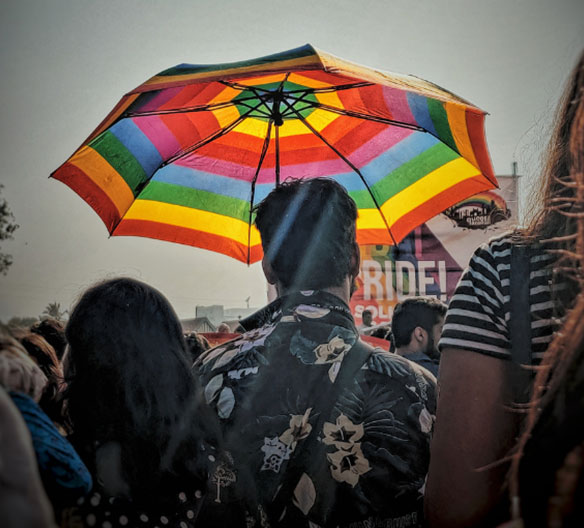What do you want to learn more about?
The Complex Mental Health Challenges of LGBTQ+ Asylum Seekers

I’ve talked about the general mental health challenges and barriers for immigrants as they navigate building lives in a new place and working through the visa process.
But, as I always like to say, it’s important not to simply ‘lump’ all immigrants together and to ensure we work to understand the nuanced experiences of different groups who identify as immigrants. The LGBTIQA+ immigrant community is one such group.
Pride month is a time to reflect on the barriers and stigma faced by LGBTIQA+ immigrants and asylum seekers and also an opportunity for us clinicians to understand further what we can do to help.
Understanding the LGBTIQA+ Immigrant Experience
In some countries, the LGBTIQA+ community faces numerous obstacles, persecutions, and legal exclusions, often leading them to flee and seek refuge elsewhere. According to the ‘Every Day I Live in Fear’ report, many of those within the LGBTIQA+ community sadly seek asylum due to threatened violence from family members.
People flee to the U.S. because they cannot live safely in their home countries. They are in danger of persecution, prosecution, imprisonment, blackmail, discrimination, torture, sexual assault, and in some cases, death based on their actual or perceived sexual orientation or gender identity.
Some asylum seekers prepare for their journey, gathering resources and support and developing their knowledge of the asylum and visa processes they must work through. Others may have to leave their homes quickly and unexpectedly, often without resources or support, arriving in the U.S. without appropriate knowledge or documentation. Some may not even know they qualify for asylum based on their sexual orientation.
LGBTIQA+ Immigrants & the U.S. Asylum Process
Seeking asylum can be long and complicated for anyone undertaking this visa route. For members of the LGBTIQA+ community who will have likely had to hide their sexual orientations or gender identity for some time, the process can be even more complicated.
Gaining asylum involves convincing decision-makers that the individual applying for asylum would be persecuted if they were to return to their home country – this includes providing evidence that they have already been victims of persecution or discrimination – or that they have a “well-founded fear of persecution” – before arriving in the U.S.
This can prove a real challenge for those who have kept their identity a secret.
Disclosing experiences of sexual violence, assault, or other forms of persecution can be retraumatizing for the individual. For those who have yet publicly disclose their LGBTIQA+ identity, being forced to talk and answer questions about it without appropriate psychological safety can lead to further mental health challenges.
Along with meeting compressed timelines for filing required documentation, the entire process can put a lot of strain and pressure on individuals who are likely already struggling with complex emotional, mental, and social challenges.
Supporting LGBTIQA+ Asylum Seekers,
Many LGBTIQA+ asylum seekers are referred to mental health support, such as psychotherapy, by their legal counsel to help them prepare for the asylum process and to mitigate risks for Re-traumatization. However, many fail to take up this support for several reasons, including fear, shame, and cultural barriers.
As clinicians, it’s essential we dedicate time in our professional practice to ensuring we’re aware of and able to offer the kind of support that meets the unique needs of these clients. By doing so, we’re better able to provide the safety and stability needed to ensure a positive experience – and hopefully a positive outcome.
In my interview with Luis Cornejo, LMFT and founder of PsychoSocial, a multimedia platform that strives to highlight issues impacting the LGBTIQA+, POC, and other disenfranchised groups, he explains the importance of making time to educate ourselves in this way:
“Education. I won’t say it’s the only surefire way to be proficient; however, it’s a start. Understanding the unique issues that affect these individuals not just LGBTQ+, but also as immigrants.“
It’s also important to know about additional resources we can tap into, Cornejo says:
“Research opportunities, programs, and support for clients. This can make a huge difference and build trust within the therapeutic relationship. Many of my past clients had various needs regarding immigration, legal issues, financial difficulties, health, and other areas.”
Promoting Resilience
Despite the trauma experienced by LGBTIQA+ asylum seekers and their challenges, many exhibit a great deal of resilience. Many LGBTIQA+ asylees cope by staying hopeful, using legal and community services, receiving support from loved ones, drawing on their religious faith, or giving back to help others.
The process of migration, leaving everything behind, and applying for asylum requires a great deal of courage. A comprehensive perspective that includes resilience is recommended to help the LGBTIQA+ asylum seeker identify with narratives of strength through adversity rather than victimization.
Culturally relevant psychosocial interventions can help LGBTIQA+ asylees identify their strengths and resilience rather than focus on pathology. LGBTIQA+ individuals can successfully overcome trauma, adapt to their new environment, and lead full lives with support.
LGBTIQA+ & the Immigration Evaluation Process
One key thing to remember is that many in the LGBTIQA+ community, especially those from migrant and asylum backgrounds, will likely need ongoing mental health support for some time.
Getting through the visa process is just the first step.
As an immigration evaluation professional, you might be the first that an LGBTIQA+ asylum client comes into contact with. This experience can easily shape how, when and why they seek further support in the future. Even though we may only work with clients for a comparably short amount of time, as a first point touch point to the mental health system within their new country, we provide an excellent insight and doorway into what a positive, empowering experience this can be.
For this reason, ensuring we are dedicating time, education and understanding to the unique needs of these clients is a vital component of our work.

I’m Cecilia Racine, and I teach therapists how to help immigrants through my online courses. As a bilingual immigrant myself, I know the unique perspective that these clients are experiencing. I’ve conducted over 500 evaluations and work with dozens of lawyers in various states. Immigrants are my passion, I believe they add to the fabric of our country.
related articles
Building Rapport with Clients in Immigration Cases
Establishing a strong therapeutic alliance is critical and challenging for mental health clinicians working with…
Invisible Wounds: The Importance of Brain Injury Awareness in Psychological Evaluations for Immigration Cases
March marks National Brain Injury Awareness Month, an essential time for mental health clinicians to…
Budget-Friendly Tips for Professional-Looking Photos
As therapists dedicated to helping individuals through crucial immigration processes, presenting a professional image is…
Join the Free
Immigration evaluation
therapists facebook group
Are you a therapist that conducts immigration evaluations?



